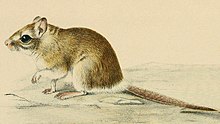Lesser short-tailed gerbil: Difference between revisions
Content deleted Content added
No edit summary |
Reformat per revised MOS:LEAD#Organisms |
||
| (42 intermediate revisions by 33 users not shown) | |||
| Line 1: | Line 1: | ||
{{Short description|Species of rodent}} |
|||
{{Taxobox |
|||
{{Speciesbox |
|||
| color = pink |
|||
| name = |
| name = Lesser short-tailed gerbil |
||
| ⚫ | |||
| status = LC |
| status = LC |
||
| status_system = IUCN3.1 |
|||
| trend = unknown |
|||
| |
| genus = Dipodillus |
||
| ⚫ | |||
| phylum = [[Chordate|Chordata]] |
|||
| authority = [[Fernand Lataste|Lataste]], 1881 |
|||
| classis = [[Mammal]]ia |
|||
| ordo = [[Rodent]]ia |
|||
| superfamilia = [[Muroidea]] |
|||
| familia = [[Muridae]] |
|||
| subfamilia = [[Gerbillinae]] |
|||
| genus = ''[[Gerbillus]]'' |
|||
| ⚫ | |||
| ⚫ | |||
| binomial_authority = Lataste, 1881 |
|||
}} |
}} |
||
The '''lesser short-tailed gerbil''' ('''''Dipodillus simoni''''') is distributed mainly from eastern [[Morocco]] to [[Egypt]]. It is also known as Simon's dipodil. After morphological and molecular studies in 2010 ''[[Dipodillus]]'' was ranged as a subgenus of ''[[Gerbillus]]'', and ''Dipodillus simoni'' was renamed into ''Gerbillus simoni''.<ref name=Abiadh>{{cite journal|last=Elsevier |author2=Awatef Abiadh |author3=M'barek Chetoui |author4=Taher Lamine-Cheniti |author5=Ernesto Capanna|title=Molecular phylogenetics of the genus Gerbillus (Rodentia, Gerbillinae): Implications for systematics, taxonomy and chromosomal evolution. "Molecular Phylogenetics and Evolution|journal=Comptes Rendus Biologies |year=2010|volume=56|issue=2|pages=513–518|doi=10.1016/j.crvi.2010.07.003|pmid=20816648 |url=https://www.researchgate.net/publication/46148011|access-date=12 February 2014}}</ref> |
|||
'''''Gerbillus simoni''''' is distributed mainly from eastern [[Morocco]] to [[Egypt]]. It is known as '''Simon's dipodil''' or the '''lesser short-tailed gerbil'''. |
|||
==References== |
==References== |
||
{{Reflist}} |
|||
* {{ |
* {{cite iucn|author=Aulagnier|author2=Granjon|name-list-style=amp|year=2004|url=https://www.iucnredlist.org/details/9149/0|title=''Gerbillus simoni''|access-date=11 May 2006}} Database entry includes a brief justification of why this species is of least concern |
||
*Musser, G. G. and M. D. Carleton. 2005. Superfamily Muroidea. pp. 894–1531 ''in'' Mammal Species of the World a Taxonomic and Geographic Reference. D. E. Wilson and D. M. Reeder eds. Johns Hopkins University Press, Baltimore. |
|||
{{Gerbillinae|G1.}} |
|||
| ⚫ | |||
{{Taxonbar|from=Q307860}} |
|||
| ⚫ | |||
[[it:Gerbillus simoni]] |
|||
| ⚫ | |||
| ⚫ | |||
[[Category:Mammals described in 1881]] |
|||
{{Gerbillinae-stub}} |
|||
Latest revision as of 09:23, 16 March 2023
| Lesser short-tailed gerbil | |
|---|---|

| |
| Scientific classification | |
| Domain: | Eukaryota |
| Kingdom: | Animalia |
| Phylum: | Chordata |
| Class: | Mammalia |
| Order: | Rodentia |
| Family: | Muridae |
| Genus: | Dipodillus |
| Species: | D. simoni
|
| Binomial name | |
| Dipodillus simoni Lataste, 1881
| |
The lesser short-tailed gerbil (Dipodillus simoni) is distributed mainly from eastern Morocco to Egypt. It is also known as Simon's dipodil. After morphological and molecular studies in 2010 Dipodillus was ranged as a subgenus of Gerbillus, and Dipodillus simoni was renamed into Gerbillus simoni.[1]
References[edit]
- ^ Elsevier; Awatef Abiadh; M'barek Chetoui; Taher Lamine-Cheniti; Ernesto Capanna (2010). "Molecular phylogenetics of the genus Gerbillus (Rodentia, Gerbillinae): Implications for systematics, taxonomy and chromosomal evolution. "Molecular Phylogenetics and Evolution". Comptes Rendus Biologies. 56 (2): 513–518. doi:10.1016/j.crvi.2010.07.003. PMID 20816648. Retrieved 12 February 2014.
- Aulagnier & Granjon (2004). "Gerbillus simoni". IUCN Red List of Threatened Species. 2004. Retrieved 11 May 2006. Database entry includes a brief justification of why this species is of least concern
- Musser, G. G. and M. D. Carleton. 2005. Superfamily Muroidea. pp. 894–1531 in Mammal Species of the World a Taxonomic and Geographic Reference. D. E. Wilson and D. M. Reeder eds. Johns Hopkins University Press, Baltimore.

